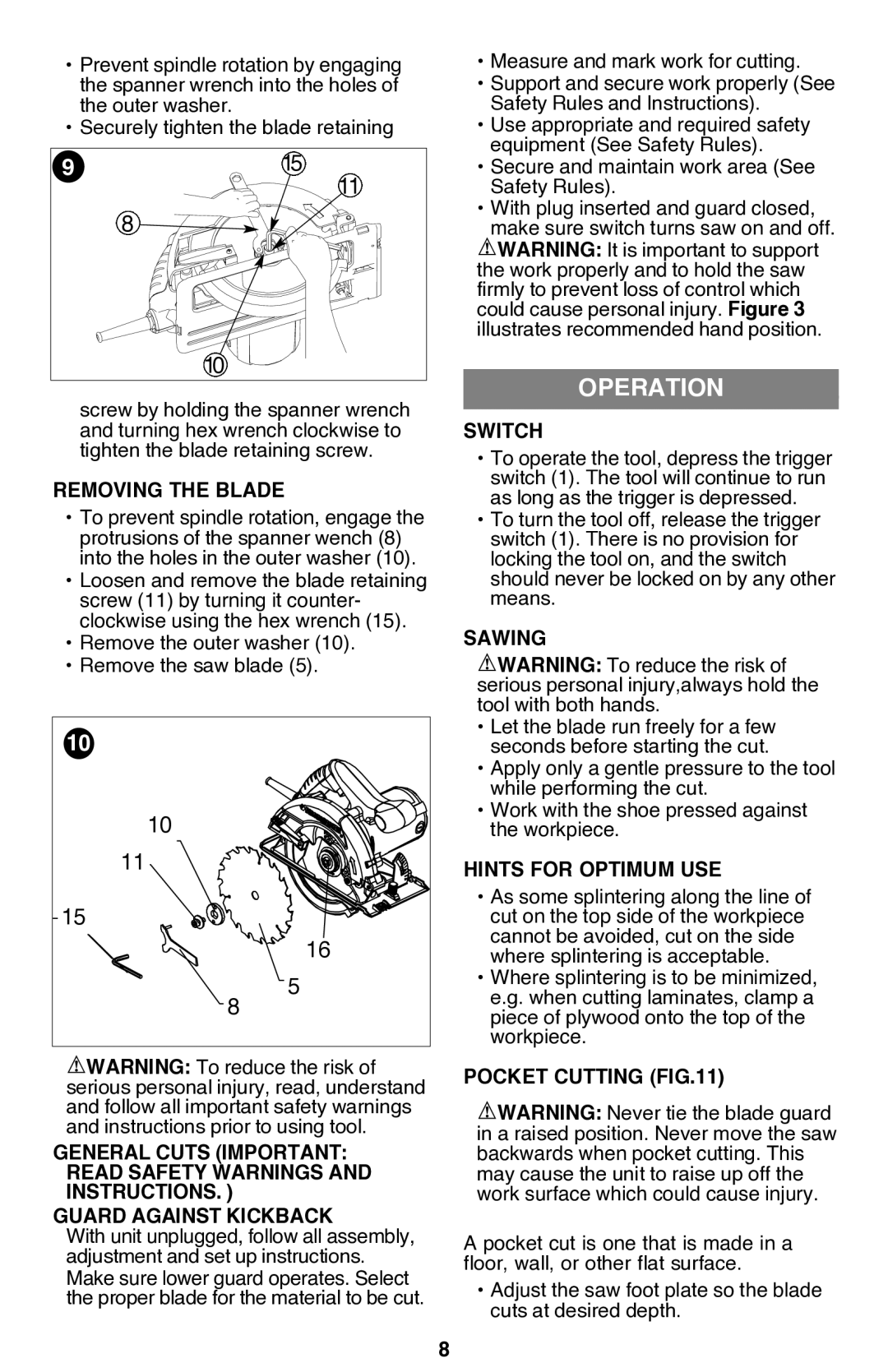
•Prevent spindle rotation by engaging the spanner wrench into the holes of the outer washer.
•Securely tighten the blade retaining
9 | 15 |
| 11 |
| 8 |
| 10 |
screw by holding the spanner wrench and turning hex wrench clockwise to tighten the blade retaining screw.
Removing the blade
•To prevent spindle rotation, engage the protrusions of the spanner wench (8) into the holes in the outer washer (10).
•Loosen and remove the blade retaining screw (11) by turning it counter- clockwise using the hex wrench (15).
•Remove the outer washer (10).
•Remove the saw blade (5).
10 |
|
10 |
|
11 |
|
15 | 16 |
| |
8 | 5 |
|
WARNING: To reduce the risk of serious personal injury, read, understand and follow all important safety warnings and instructions prior to using tool.
GENERAL CUTS (IMPORTANT: Read safety warnings and instructions. )
GUARD AGAINST KICKBACK
With unit unplugged, follow all assembly, adjustment and set up instructions. Make sure lower guard operates. Select the proper blade for the material to be cut.
• Measure and mark work for cutting.
• Support and secure work properly (See Safety Rules and Instructions).
• Use appropriate and required safety equipment (See Safety Rules).
• Secure and maintain work area (See Safety Rules).
• With plug inserted and guard closed, make sure switch turns saw on and off. ![]() WARNING: It is important to support the work properly and to hold the saw firmly to prevent loss of control which could cause personal injury. Figure 3 illustrates recommended hand position.
WARNING: It is important to support the work properly and to hold the saw firmly to prevent loss of control which could cause personal injury. Figure 3 illustrates recommended hand position.
Operation
SWITCH
•To operate the tool, depress the trigger switch (1). The tool will continue to run as long as the trigger is depressed.
•To turn the tool off, release the trigger switch (1). There is no provision for locking the tool on, and the switch should never be locked on by any other means.
sawing
WARNING: To reduce the risk of serious personal injury,always hold the tool with both hands.
• Let the blade run freely for a few seconds before starting the cut.
• Apply only a gentle pressure to the tool while performing the cut.
• Work with the shoe pressed against the workpiece.
hints for optimum use
•As some splintering along the line of cut on the top side of the workpiece cannot be avoided, cut on the side where splintering is acceptable.
•Where splintering is to be minimized, e.g. when cutting laminates, clamp a piece of plywood onto the top of the workpiece.
POCKET CUTTING (fig.11)
![]() WARNING: Never tie the blade guard in a raised position. Never move the saw backwards when pocket cutting. This may cause the unit to raise up off the work surface which could cause injury.
WARNING: Never tie the blade guard in a raised position. Never move the saw backwards when pocket cutting. This may cause the unit to raise up off the work surface which could cause injury.
A pocket cut is one that is made in a floor, wall, or other flat surface.
•Adjust the saw foot plate so the blade cuts at desired depth.
8
